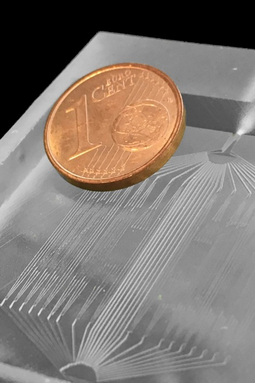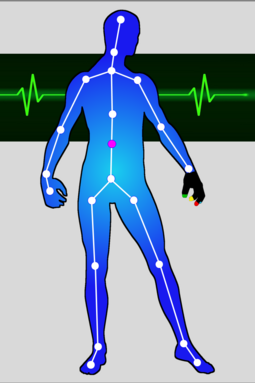Applying engineering principles and methodologies to devise innovative solutions to open-ended, unmet challenges in health, medicine and biology to improve human lives.

Bioelectromagnetism
Towards a safe and beneficial applications of electromagnetic energy in ICT and medicine
Bioelectromagnetism concerns the study of the interactions between electromagnetic fields and biological systems. Our areas of expertise consist in human exposure assessment to electromagnetic fields by both deterministic and stochastic computational electromagnetics techniques, statistical modelling of exposure by Machine Learning approaches, computational modeling of the interactions between electromagnetic fields and the human body at different levels (from micro to macro) and the development and evaluation of medical applications of electromagnetic fields. These skills are covered by the “EMF4Health Laboratory”.
Laboratories: EMF4Health
Infrastructure Facilities: Computational Bioelectromagnetic Laboratory
Projects: ESPOJAM | RFBIO | GREAM3 | EXPOAUTO | META-BRAIN | TREES MAG
Tissue engineering
Recreating tissues through the combination of the principles and methods of life science with those of engineering
Research activities are mainly centered on the development of (a) new intelligent biomaterials for regenerative medicine applications, and (b) fluidic bioreactors providing the physiological stimuli to cells and tissues.
Starting from these considerations, the group is actively involved in these topics: a) design, engineering and development of 3D functional biomaterials as tissue substitutes or reliable model systems of 3D tissues ex vivo (b) design and development of innovative bioreactor systems for culturing engineered tissues in 3D environment under proper physical stimulations (i.e. mechanical, electromagnetic, fluidic stimuli); c) innovative 3D model systems to investigate fundamental aspects of cell differentiation and tissue development under controlled and defined conditions, both healthy and pathological such as cancer disease.
Laboratories: Bioengineering and Tissue Engineering
Infrastructure Facilities: Bioengineering Lab


ICT for Health and Well-Being
Non-invasive technologies for health, training, and sport
This multidisciplinary research area aims at the automatic assessment of health parameters and motor performance by bringing together principles and methods of kinesiology and physiology with computer science.
The automated assessment is applied in the context of wellness and health monitoring, rehabilitation, sports and training. It is based on computer vision, machine learning and signal processing methodologies applied to the analysis and the characterization of the body movements and of the physiological signals acquired by non-invasive sensors, among which RGB-Depth sensors, custom 2D/3D single-camera and multi-camera systems, body sensor networks. Potential applications of the research activity include, but are not limited to: monitoring and rehabilitation of neurological diseases; athletic performance assessment; AR/VR based training of operators; sleep monitoring; pandemic monitoring.
Laboratories: Non-invasive ICT Technologies
Infrastructure Facilities: EHW Lab
Current Projects: OMNIA-PARK
Completed Projects: ReHome | Tango